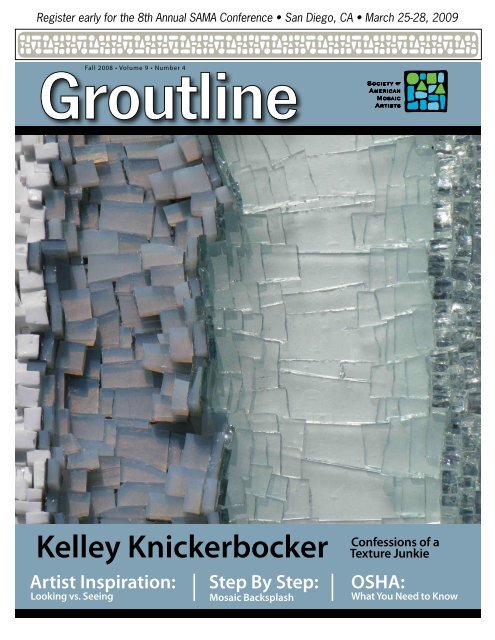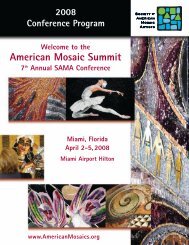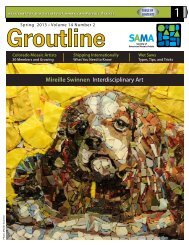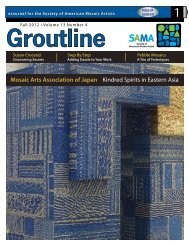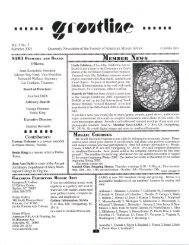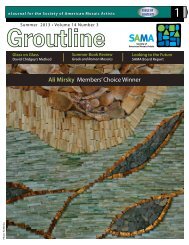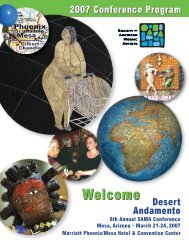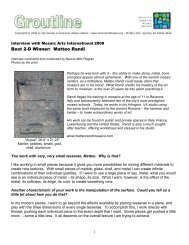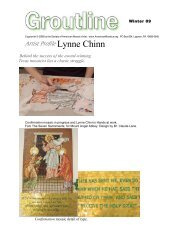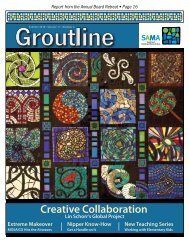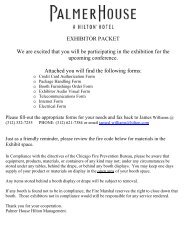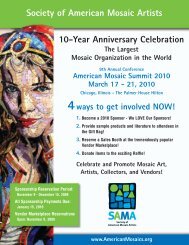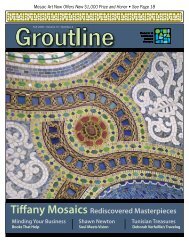Kelley Knickerbocker - Society of American Mosaic Artists
Kelley Knickerbocker - Society of American Mosaic Artists
Kelley Knickerbocker - Society of American Mosaic Artists
You also want an ePaper? Increase the reach of your titles
YUMPU automatically turns print PDFs into web optimized ePapers that Google loves.
Register early for the 8th Annual SAMA Conference • San Diego, CA • March 25-28, 2009<br />
Fall 2008 • Volume 9 • Number 4<br />
<strong>Kelley</strong> <strong>Knickerbocker</strong><br />
Artist Inspiration:<br />
Looking vs. Seeing<br />
Step By Step:<br />
<strong>Mosaic</strong> Backsplash<br />
Confessions <strong>of</strong> a<br />
Texture Junkie<br />
OSHA:<br />
What You Need to Know
From The President<br />
SAMA<br />
Board and Officers<br />
Officers<br />
President<br />
Karen Ami<br />
Vice President<br />
Rhonda Heisler<br />
Secretary<br />
Andrea S. Taylor<br />
Treasurer<br />
Bonnie Fitzgerald<br />
Board <strong>of</strong> Trustees<br />
Yvonne Allen<br />
Bill Buckingham<br />
Susannah Dryden<br />
Sue Giannotti<br />
Sheilah Jewart<br />
Shug Jones<br />
Dedra Lipscomb<br />
Gwyn Kaitis<br />
Sharon Plummer<br />
Hillary Sloate<br />
Advisory Board<br />
Dianne Crosby<br />
Lori Greene<br />
Ruth Wunsh<br />
Executive Director<br />
Dawnmarie Zimmerman<br />
Operations Manager<br />
Chris Forillo<br />
Membership Director<br />
Sue Giannotti<br />
Volunteer Coordinator<br />
Yvonne Allen<br />
Groutline 2B Creative Team<br />
STAFF Editor<br />
Gina Marie Mayfield<br />
Design Director<br />
Barbara Dybala<br />
Groutline Advertising Sales<br />
Bryan Felix 951-204-7887<br />
advertising@americanmosaics.org<br />
Contributors: Barbara Coots, Jo Ann Locktov,<br />
Rhonda Heisler, Shug Jones, Dawnmarie<br />
Zimmerman<br />
Groutline is published quarterly to promote<br />
mosaic art in the U.S. and abroad.<br />
© 2008 <strong>Society</strong> <strong>of</strong> <strong>American</strong> <strong>Mosaic</strong> <strong>Artists</strong>.<br />
Reproduction or distribution prohibited<br />
without permission. Address: P.O. Box 624,<br />
Ligonier, PA 15658-0624<br />
Editorial queries may be sent to<br />
groutline@americanmosaics.org.<br />
On the Cover Detail <strong>of</strong> 33º F,<br />
<strong>Kelley</strong> <strong>Knickerbocker</strong>’s 18-inch by 16-inch<br />
glass mosaic, 2007<br />
Our Membership Director, Sue Giannotti,<br />
recently informed our board that<br />
our member count now exceeds 1,100. A tiny community <strong>of</strong> artists and mosaic<br />
enthusiasts has grown in just nine years into the largest mosaic arts organization in<br />
the world. If you’re a new member, we welcome you and encourage you to jump in and<br />
get acquainted.<br />
This issue <strong>of</strong> Groutline will give a slice <strong>of</strong> the<br />
SAMA organization. You’ll find technical advice<br />
from a seasoned pr<strong>of</strong>essional, insight into one<br />
artist’s sources <strong>of</strong> inspiration, and a look at how<br />
another mosaicist experiments with materials<br />
and finds her artistic voice. You will also discover<br />
the nation’s capital is rich in extraordinary public<br />
mosaic work, and learn how SAMA members in<br />
Houston are inspiring and supporting each other<br />
and promoting mosaics to their own community.<br />
The SAMA website is another great resource<br />
for members. You can check out the news and<br />
announcements, browse the Member’s Gallery,<br />
check out the mosaic resources including supplier<br />
and educational opportunities, and explore the<br />
content available in the Members Only section.<br />
Follow the weblinks and network with the people<br />
you meet there. You will find we are a generous<br />
and diverse group, all united by a passion for creating<br />
in the unique medium <strong>of</strong> mosaic art.<br />
If you’re hungry for inspiration, community,<br />
and the sharing <strong>of</strong> information, I recommend you<br />
attend the next annual conference, March 25-28 in<br />
Inside Fall 2008<br />
SAMA News 10-11<br />
SAMA Member’s <strong>Mosaic</strong> in Guggenheim 12<br />
Feature<br />
Travel, <strong>Mosaic</strong> Style: Washington, D.C. 6-7<br />
Departments<br />
Inspiration: Looking vs. Seeing 3<br />
Launching a Regional <strong>Mosaic</strong> Group 4<br />
Artist Pr<strong>of</strong>ile:<br />
Confessions <strong>of</strong> a Texture Junkie 5<br />
Ask A Pro:<br />
OSHA, What You Need to Know 8<br />
Step By Step:<br />
<strong>Mosaic</strong> Backsplash on Backer Board 9<br />
San Diego. The workshops <strong>of</strong>fered will provide you<br />
educational opportunities in many different areas<br />
<strong>of</strong> interest. The <strong>Mosaic</strong> Arts International exhibition<br />
is always a conference highlight and <strong>of</strong>fers you<br />
the chance to see the very best in contemporary<br />
mosaics and to actually talk to the artists, many<br />
<strong>of</strong> whom will be totally accessible throughout<br />
the “conference. “<br />
Who knows? By the end <strong>of</strong> the conference you<br />
may be so inspired you’ll volunteer to serve on a<br />
committee. Your immersion will be complete. In<br />
fact, we depend on it, because dedicated volunteers—including<br />
our board members—make our<br />
conference and all our other programs and activities<br />
possible. I hope to see you all in San Diego!<br />
President<br />
The <strong>Society</strong> <strong>of</strong> <strong>American</strong> <strong>Mosaic</strong> <strong>Artists</strong><br />
Besides serving as president <strong>of</strong> SAMA, Karen Ami<br />
is the founder and Executive Director <strong>of</strong> The Chicago<br />
<strong>Mosaic</strong> School, artist and sculptor, mama, and amateur<br />
boxer. www.chicagomosaicschool.com.<br />
Patron Members<br />
Bill Buckingham <strong>Mosaic</strong> Rocks!<br />
Aysel Ergul<br />
Timothy Falb<br />
di <strong>Mosaic</strong>o<br />
Jacqueline Iskander Jacqueline Iskander <strong>Mosaic</strong>s<br />
Sonia King<br />
Sonia King <strong>Mosaic</strong>s<br />
Ann-Britt Malden Hakatai Enterprises, Inc.<br />
Jane O’Donnell<br />
<strong>Mosaic</strong> Studio and Gallery LLC<br />
Drucilla M. Perez-Tubens<br />
Bart Streuter<br />
Laurel True<br />
Barbara Vargas<br />
Donna Young<br />
Streuter Industries<br />
Institute <strong>of</strong> <strong>Mosaic</strong> Art/<br />
<strong>Mosaic</strong> Studio Supply<br />
<strong>Mosaic</strong> Basics<br />
<strong>Mosaic</strong> Art Source
The world around is a source <strong>of</strong> inspiration.<br />
My<br />
Inspiration<br />
by Ruth J. Wunsh<br />
One artist’s inspiration lies in<br />
not just looking, but seeing, the<br />
beauty that surrounds us.<br />
Wolf Pack. 2008<br />
Photo: Ruth Wunsh<br />
A<br />
sign in my optometrist’s <strong>of</strong>fice reads “Sight is a sense, seeing<br />
is an art.” The world around us, the people and creatures that<br />
inhabit it, are sources <strong>of</strong> inspiration. I think the problem sometimes<br />
lies in looking but not seeing.<br />
My family includes three adopted children (two from India and one<br />
with Down syndrome) and two different religions. Our dear friends<br />
come from many countries and represent many faiths and colors,<br />
which enriches our lives immeasurably. Inspired by this diversity, I<br />
started a series <strong>of</strong> mosaics about overcoming injustice to others. The<br />
first, Embrace, was included in the 2008 MAI Exhibition. The second,<br />
Born in the USA, demonstrates that most individuals love children, but<br />
as they near puberty, some people see only so-called differences. Has<br />
the child changed, or has our perspective become skewed? The third<br />
mosaic is an abstract maze titled Life. As I see it, life is filled with hurdles,<br />
roadblocks, twists, turns, and false paths, as well as its pleasures,<br />
unexpected rewards, and character-building challenges. It’s this<br />
that wakes us up full <strong>of</strong> anticipation and puts us to sleep exhausted<br />
but complete.<br />
Heavenly Bodies, my second mosaic series, was inspired by images<br />
<strong>of</strong> an awesome and unspeakably live and colorful universe, sent back to<br />
Earth from the Hubble telescope. The visions <strong>of</strong> objects so unimaginably<br />
huge can either make us feel incredibly small or tremendously significant<br />
as part <strong>of</strong> something so rich, complex, and endless. I choose the latter<br />
view, attempting to capture this boundless movement and color in the<br />
Swan Nebula (juried into the University <strong>of</strong> Mary Washington’s mosaic<br />
show this fall), the Orion Nebula, and RCW-49.<br />
A third theme, The Other Inhabitants, focuses on the animal kingdom<br />
I love. I’ve tried to recognize their affection, closeness, intelligence, protectiveness,<br />
and warmth. Wolf Pack, the first in this series, took an honorable<br />
mention at the Art Museum in South Carolina—the only mosaic<br />
entered in this fine arts show.<br />
When seeking inspiration, I find all I need is the time and willingness<br />
to see the world around me, the ability to concentrate on what<br />
moves me emotionally, and the discipline to stay focused on the<br />
creative process.<br />
Ruth Wunsh, a member <strong>of</strong> SAMA’s Advisory Board, has a Masters in <strong>Mosaic</strong>a from Orsoni,<br />
and has studied at the Chicago <strong>Mosaic</strong> School, Maverick <strong>Mosaic</strong>s, and the NY Studio<br />
School <strong>of</strong> Sculpture. mosaicsbyruth.com<br />
<strong>Society</strong> <strong>of</strong> <strong>American</strong> <strong>Mosaic</strong> <strong>Artists</strong> 3
Imagine the energy <strong>of</strong> a national SAMA meeting continued on a local level.<br />
How to Create a Regional <strong>Mosaic</strong> Group by Sharon Plummer<br />
Starting a regional mosaic group in your area is easier than you think. Here, one <strong>of</strong> the founders <strong>of</strong> MOSAICO, <strong>Society</strong> <strong>of</strong> Houston <strong>Mosaic</strong> <strong>Artists</strong>,<br />
shares her success in creating what she calls “year-round inspiration and camaraderie.”<br />
Starting a local Group<br />
Locate mosaic artists in your area.<br />
The new SAMA Member Directory<br />
lists members who elected to be<br />
included by actively “opting-in.”<br />
Members <strong>of</strong> the MAO Yahoo group<br />
can post information about a<br />
regional group in FILES.<br />
Review the list <strong>of</strong> attendees at the<br />
annual SAMA conference (included<br />
in the registration packet).<br />
Find SAMA members in your state<br />
who have websites in the “View<br />
by Region” list on the “Member<br />
Websites” page within the<br />
“Members Only” section.<br />
Determine a convenient date,<br />
time, and location for an initial<br />
meeting. At this meeting, assess<br />
level <strong>of</strong> interest and discuss<br />
frequency <strong>of</strong> meetings, locations,<br />
group structure, group goals, etc.<br />
Begin meeting on a regular basis<br />
and continue discussing group<br />
structure and goals.<br />
Formal group with <strong>of</strong>ficers,<br />
reporting <strong>of</strong> minutes, and<br />
membership dues?<br />
Casual group with members<br />
sharing organizational<br />
responsibilities?<br />
Occasionally conduct a<br />
process review to make sure<br />
that structure, goals, and<br />
activities <strong>of</strong> the group are in line<br />
with members’ needs.<br />
Decide how to handle group<br />
communications, photo posting,<br />
sharing <strong>of</strong> files: Consider setting<br />
up a Yahoo group.<br />
Recruit new members.<br />
Consider a group website.<br />
Create group business cards.<br />
Publicize group activities and<br />
meetings in local publications<br />
and online arts calendars.<br />
Talk about the group in<br />
social settings.<br />
MOSAICO members attend a weekend retreat in Rockport, Texas, just one <strong>of</strong> the many perks <strong>of</strong> a regional group.<br />
Back row: Susie Curry, Sharon Plummer, Sheri Lapin, Penny Laird, Anne Krum. Front row: Tania DeJohn, Lisa Bonin.<br />
Imagine having a team <strong>of</strong> personal coaches immediately accessible for mosaic inspiration, consultation,<br />
technical advice, encouragement, collaboration, and celebration.<br />
This seemingly fantasy-world is a reality for mosaicists in Houston, Texas. MOSAICO, <strong>Society</strong> <strong>of</strong><br />
Houston <strong>Mosaic</strong> <strong>Artists</strong>, is a thriving group organized in September 2005.<br />
Our fun-filled, educational gatherings have become a monthly highlight—and we carefully guard the second<br />
Saturday <strong>of</strong> each month to avoid scheduling conflicts. Frequently someone demonstrates a special tool or technique,<br />
then members display recently completed pieces and works in progress. The 20 members come from all<br />
experience levels. Meetings average 10 to 12 attendees and take place in our homes and studios. We meet for<br />
about two hours and then head to a nearby restaurant to continue conversations over lunch.<br />
We’ve mounted two group shows, participated in another show, and been involved in two community<br />
projects. Several members have collaborated on commissions. Another nice benefit is buying supplies in<br />
quantity to receive discounts and sharing the products and savings.<br />
Last fall we decided to downplay the promotion <strong>of</strong> individual artists’ business activities and realigned<br />
our goals to become a support and inspiration group only. We ended membership dues and discussed<br />
what to do with the funds in the treasury. A member suggested contributing the money to SAMA’s Robin<br />
Brett Scholarship Fund, and the group immediately recognized the appropriateness <strong>of</strong> that act in supporting<br />
mosaic education and training.<br />
That contribution got us thinking about how fortunate we are to have an organization like SAMA that<br />
provides such incredible support <strong>of</strong> our passion for mosaics. The services and opportunities we receive<br />
are unmatched by any other pr<strong>of</strong>essional or arts organization we know <strong>of</strong>. We decided to show our appreciation<br />
by making a group contribution <strong>of</strong> $1,500 to become a Bronze Circle sponsor <strong>of</strong> the 2008 SAMA<br />
conference. Our collection effort has begun again for the 2009 conference. We feel really good about playing<br />
a part in the successful operation <strong>of</strong> an organization that has promoted our individual development<br />
and actively promotes the appreciation <strong>of</strong> mosaic art to the public and the arts community.<br />
Photo: Sharron Plummer<br />
For more information about<br />
MOSAICO, visit www.mosaico.ws.<br />
Sharon Plummer fell in love with mosaics 10 years ago, works primarily in bright colors <strong>of</strong> all tesserae types, and especially enjoys<br />
creating garden art. www.flickr.com/photos/plumartmosaics. To see more MOSAICO images, please visit the SAMA website.<br />
4 <strong>Society</strong> <strong>of</strong> <strong>American</strong> <strong>Mosaic</strong> <strong>Artists</strong>
Create interaction through reflected light and movement that goes beyond the mosaic surface.<br />
Artist Pr<strong>of</strong>ile<br />
Confessions<br />
<strong>of</strong> a Texture<br />
Junkie<br />
by <strong>Kelley</strong> <strong>Knickerbocker</strong><br />
Hi. I’m <strong>Kelley</strong>, and I’m a glass texture junkie.<br />
The visual depth and light-handling<br />
properties <strong>of</strong> glass hypnotize me like the<br />
goodies in the window <strong>of</strong> a French pastry<br />
shop. Resistance is futile…<br />
33° F, 2007<br />
Photo: <strong>Kelley</strong> <strong>Knickerbocker</strong><br />
In 2005, when I took my first mosaic class with Laurel True at the<br />
Institute <strong>of</strong> <strong>Mosaic</strong> Art (IMA), I noticed that the mirror elements in<br />
much <strong>of</strong> her work added an element <strong>of</strong> interaction: any movement<br />
in front <strong>of</strong> the mosaic becomes part <strong>of</strong> the mosaic. I filed that intriguing<br />
thought away and began working primarily in unglazed porcelain.<br />
Soon, though, I couldn’t resist mixing glass in with the unglazed<br />
porcelain for the tasty contrast between its shiny depth and porcelain’s<br />
matte opacity. I also enjoyed the texture produced by mixing different<br />
heights <strong>of</strong> glasses and porcelains. That led me to explore what surface<br />
textures (muffles, ripples, etc.) were available in stained glass. There<br />
were some, but I discovered that clear architectural glass was available<br />
in a full-on patisserie <strong>of</strong> textures. My fall was imminent.<br />
Coincidentally, I live just around the corner from a commercial<br />
stained glass studio and retailer housing a limitless supply <strong>of</strong> textured<br />
architectural glass. How cool is that?! Grids, crackles, dots, vines,<br />
veins, swirls—bring on the éclairs! I remembered that intriguing idea <strong>of</strong><br />
creating interaction through reflected light and movement, and imagined<br />
creating a similar interaction by layering a field <strong>of</strong> clear textured glass<br />
over plain glass to capture the color, light, and movement occurring<br />
beyond the mosaic surface (In Relation To, 2007). I was in heaven.<br />
But like any junkie, I craved more. I wanted more height variations in<br />
the tesserae. I got to thinking that if I were to mix tall chunks <strong>of</strong> smalti<br />
transparenti with the clear textured glass, get rid <strong>of</strong> the grout so that<br />
there was no impediment to light pass-through, and group some regular<br />
smalti and Karma glass next to the field <strong>of</strong> transparency to dramatize<br />
the contrast between opaque and transparent, I would create a sublime<br />
textural experience. And what the heck, why not put the whole thing<br />
on a mirror substrate for a twist on the “Laurel True Effect”? Light and<br />
movement would be reflected in the mirror and distorted by the gazillion<br />
textures <strong>of</strong> the architectural glass (33° F, 2007)! Now we were talkin’!<br />
Could I stop there? No. The mirror substrate <strong>of</strong>fered more<br />
possibilities. What if I put translucent glass over mirror, then in some<br />
places stairstep a second layer, then a third? The first layer would be<br />
luminous with light reflecting back from the mirror, and successive<br />
layers would appear darker and would naturally form a 3-D “landscape”<br />
effect (Love As Hail, 2008). I confess, I’m up to seven layers now (Oil<br />
Meets World, 2008).<br />
These days I teach my techniques so that I can spend time with<br />
other junkies. Please, if there’s a Textureholics Anonymous group out<br />
there, don’t tell me about it. I’m having too much fun!<br />
<strong>Kelley</strong> <strong>Knickerbocker</strong> left a 22-year program management career with the University<br />
<strong>of</strong> Washington in 2006 to found Rivenworks <strong>Mosaic</strong>s (www.rivenworksmosaics.com),<br />
which specializes in custom fine art mosaic for public, commercial, and residential settings.<br />
She teaches textured glass and stacked glass techniques through Seattle Stained Glass.<br />
www.seattlestainedglass.com/classes<br />
<strong>Society</strong> <strong>of</strong> <strong>American</strong> <strong>Mosaic</strong> <strong>Artists</strong> 5
Travel, <strong>Mosaic</strong> Style<br />
b y L y n n d e h n C a r p e n t e r<br />
Of course there’s the White House, the Lincoln Memorial, and such, but Washington, D.C., has much more to <strong>of</strong>fer those<br />
interested in mosaic arts. Here, an insiders’ guide to beautiful spaces in lesser known places.<br />
In Washington, D.C., as in many other cities around the<br />
world, the best known mosaic sites can be found by visiting<br />
numerous churches and museums. But there’s also a wealth <strong>of</strong><br />
mosaic art in other spots throughout the city, creating beautiful<br />
spaces in lesser known places.<br />
Any mosaic tour should start with the largest, most noteworthy,<br />
and inspiring collection <strong>of</strong> mosaics in the nation’s capital:<br />
The Basilica <strong>of</strong> the National Shrine <strong>of</strong> the Immaculate Conception<br />
(www.nationalshrine.com). <strong>Mosaic</strong>s varying from ancient to<br />
modern styles adorn the exterior dome, the soaring vaulted<br />
ceilings,the o rnate arches, and the individual chapels throughout<br />
the shrine. From the gigantic and powerful mosaic <strong>of</strong><br />
Christ in Majesty, the centerpiece <strong>of</strong> the upper church, to the<br />
gently undulating blue mosaic walls <strong>of</strong> Our Lady <strong>of</strong> Guadalupe<br />
Chapel, this location is a must-see for mosaic artists.<br />
A heavenly pageant <strong>of</strong> saints and other sacred images in the<br />
Byzantine style <strong>of</strong> mosaic are found within the gilded sanctuary,<br />
nave, and balcony <strong>of</strong> Saint Sophia Greek Orthodox Cathedral<br />
(www.saintsophiawashington.org). Biblical passages, large<br />
panoramic scenes <strong>of</strong> the Umbrian hills, and religious icons<br />
are spectacularly depicted in mosaic throughout the Cathedral<br />
<strong>of</strong> Saint Matthew the Apostle (www.stmatthewcathedral.org).<br />
See additional examples <strong>of</strong> traditional iconic mosaics along the<br />
Rosary Portico, garden paths, and near the entrance into the main<br />
church <strong>of</strong> the Franciscan Monastery (www.myfranciscan.com).<br />
Two beautifully executed freestanding 17- foot by 51-foot<br />
mosaic murals are artistic focal points in the lobbies <strong>of</strong> the<br />
AFL-CIO headquarters. The viewer is instantly riveted<br />
by the symbolism <strong>of</strong> workers’ labor and by America’s achieve<br />
Both <strong>of</strong> these stunning mosaics created in <strong>American</strong> marble,<br />
Italian glass, and gold were executed by skilled union<br />
craftsmen under the direction <strong>of</strong> <strong>American</strong> muralist Lumen<br />
Martin Winter.<br />
A tour <strong>of</strong> the Jefferson Building <strong>of</strong> the Library <strong>of</strong> Congress<br />
(www.loc.gov/jefftour), takes you along Italianate mosaic<br />
floors and unpolished marble mosaic corridors, and past mosaic<br />
vaulted ceilings. On the second floor, atop the grand central<br />
staircase, is a larger-than-life mosaic <strong>of</strong> Minerva designed by<br />
Elihu Vedder. The Members <strong>of</strong> Congress Reading Room is not<br />
open to the public, but the two large glass mosaic murals<br />
within may be seen by special tour or on the website.<br />
Notable public mosaic installations are part <strong>of</strong> the Metro’s Art<br />
in Transit Program (www.wmata.com/about/intro/index.html)<br />
and the Ronald Reagan Washington Airport Art Program<br />
(www.metwashairports.com/reagan/dca_art_program).<br />
The long exterior mosaic frieze surrounding the entrance <strong>of</strong> the<br />
Anacostia Metro Station vibrantly highlights the rich natural<br />
and social histories <strong>of</strong> the area. The geometry <strong>of</strong> the Glenmont<br />
Metro Station and walkways are s<strong>of</strong>tened by the stylized mosaic<br />
images <strong>of</strong> birds, stars, and sky <strong>of</strong> the long friezes overhead.<br />
The New Carrollton Metro Station parking facility is enlivened<br />
by the bright splashes <strong>of</strong> colorful glass mosaics imitating the<br />
dawn and dusk skyline. These public works and the ten terrazzo<br />
floor medallions found at Ronald Reagan Airport (terminals<br />
B and C) exemplify the collaboration between architects<br />
and artists.<br />
Last but not least, there are two endearing community mosaic<br />
projects in Washington. The 300 cheerful mosaic figures <strong>of</strong><br />
Hopscotch Bridge that tumble their way across the H Street<br />
Bridge were created by inner-city youngsters selected through a<br />
competition and the recommendations <strong>of</strong> art teachers. The other,<br />
Roots & Dreams, The YuMe Tree, covers the side <strong>of</strong> the CVS<br />
pharmacy at 500 12th Street SE. More than 1,000 neighborhood<br />
children made and signed every ceramic tile on the mosaic tree,<br />
expressing their hopes and dreams for their neighborhood.<br />
Lynndehn Carpenter, is a Washington, D.C., area artist, and co-organizer<br />
and author <strong>of</strong> the “<strong>Mosaic</strong>s <strong>of</strong> Washington, D.C., Area” tour and guidebook<br />
(SAMA 2005).<br />
Photos: Lynndehn Carpenter<br />
The tour book created for the Washington D.C. 2005 conference is still available on the second page <strong>of</strong> the Publications section <strong>of</strong> the SAMA Shop website.<br />
You’ll find detailed information about sites in D.C., Maryland, and Virginia. Metro stop information and walking directions are also included.<br />
Dumbarton Oaks, a little-known repository for a historic collection <strong>of</strong> books and images <strong>of</strong> mosaics <strong>of</strong> the Byzantine era, features the early 20th century<br />
collection <strong>of</strong> Robert and Mildred Bliss. Today their former estate in Georgetown houses a Harvard Research Library and a small gem <strong>of</strong> a museum where<br />
you can literally walk on ancient Roman mosaics while viewing an amazing collection <strong>of</strong> Byzantine and Pre-Columbian art, including mosaics, metal, glass,<br />
and pottery. The estate is surrounded by fabulous gardens containing a large pebble mosaic fountain and more mosaics on the walls <strong>of</strong> the poolhouse.<br />
Dumbarton Oaks supports scholarly research through fellowships and grants and publishes books such as <strong>Mosaic</strong>s <strong>of</strong> Hagia Sophia, Istanbul.<br />
–Gwyn Kaitis
Detail <strong>of</strong> the ceiling <strong>of</strong> Saint Sophia Greek Orthodox Cathedral.<br />
Detail <strong>of</strong> central figures <strong>of</strong> Labor Omnia Vincit-Virgil mosaic mural at the AFL-CIO<br />
Headquarters representing man as provider and protector <strong>of</strong> the family.<br />
Neighborhood youth express their hopes on each tile <strong>of</strong> ROOTS & DREAMS,<br />
The YuMe Tree.<br />
Christ in Majesty, the centerpiece <strong>of</strong> the upper church <strong>of</strong> the Basilica <strong>of</strong> the National<br />
Shrine <strong>of</strong> the Immaculate Conception.<br />
Detail <strong>of</strong> a 4-foot by 7-foot panel <strong>of</strong> River Spirits <strong>of</strong> the Anacostia frieze at the<br />
Anacostia Metro Station.<br />
Unpolished marble mosaic adorns the vaulted ceilings at the Jefferson<br />
Building <strong>of</strong> Library <strong>of</strong> Congress.
A $1,500 fine for a mustache? Be prepared when an OSHA <strong>of</strong>ficer comes calling.<br />
Ask A Pro<br />
OSHA: What You Need to Know by Josh Blanc<br />
The president <strong>of</strong> the Handmade Tile Association and owner <strong>of</strong> Clay Squared to Infinity shares what he and a fellow artist learned the hard way—<br />
how to work toward health and safety compliance.<br />
A<br />
Minnesota Occupational Safety<br />
and Health Administration (OSHA)<br />
compliance <strong>of</strong>ficer stopped in unannounced<br />
to North Prairie Tileworks (NPT)<br />
this summer. Roger Mayland, a friend <strong>of</strong><br />
mine and owner <strong>of</strong> NPT, says he was surprised<br />
but felt he had nothing to hide. The<br />
<strong>of</strong>ficer spent the day with NPT studying how<br />
the staff worked and reviewing the safety<br />
and health issues and practices. While he<br />
was there, an employee with a mustache<br />
put on a mask while doing general work<br />
and NPT was cited for a violation in excess<br />
<strong>of</strong> $1,500 (later, through negotiations, the<br />
fine down was reduced to less than $600).<br />
The same <strong>of</strong>ficer stopped in and did three<br />
periods <strong>of</strong> reviews <strong>of</strong> my studio, Clay Squared<br />
to Infinity (CSI). No silica dust was present,<br />
which was OSHA’s main reason for doing the<br />
review. However, we were cited for lead on<br />
the premises. There were no signs <strong>of</strong> it being<br />
airborne, which is OSHA’s main concern, and<br />
there is no standard for what is an acceptable<br />
lead level, so we could not be fined on<br />
that issue. CSI was also cited for not having a<br />
health and safety manual; we were required<br />
to complete one within 25 days.<br />
We certainly heard the message that all<br />
mosaic artists need to be aware <strong>of</strong>: Health<br />
and safety are important issues for anyone<br />
working in tile and mosaics. OSHA has a list<br />
<strong>of</strong> health and safety requirements worth following<br />
whether an <strong>of</strong>ficer shows up at your<br />
door or not—and the rules apply to you even<br />
if you do not have employees. OSHA also<br />
<strong>of</strong>fers a free consultation so you can have<br />
your workspace assessed without fear <strong>of</strong> being<br />
fined. I highly recommend this. Safety<br />
grants <strong>of</strong> up to $10,000 are available to studios<br />
for health and safety improvements (see<br />
http://www.doli.state.mn.us/grants.html).<br />
I had never expected OSHA would inspect<br />
my shop and had never checked the OSHA<br />
website to learn what I should be doing by<br />
law. For the most part, I was doing things<br />
correctly, but there’s always room for improvement.<br />
For instance, I now label everything<br />
so anyone in my studio knows what<br />
is potentially hazardous and what is not (a<br />
very important issue to OSHA). If you have<br />
employees, you must post written guidelines<br />
and material safety data sheets (MSDS).<br />
Each state has specific rules to be followed.<br />
Save yourself stress and potential fines by<br />
taking the time to read up on mandatory<br />
regulations and understand what is expected<br />
<strong>of</strong> you.<br />
Safety Dos<br />
and Don’ts<br />
Always wear safety<br />
glasses, mask, and<br />
rubber gloves when<br />
using any form <strong>of</strong><br />
cement or thin set.<br />
Safety grants <strong>of</strong> up<br />
to $10,000 are<br />
available to studios<br />
for health and safety<br />
improvements (see<br />
http://www.doli.state.<br />
mn.us/grants.html).<br />
Photos page 8 and 9: Shug Jones<br />
Tell us<br />
what you’d like<br />
to read or write!<br />
Send your<br />
story ideas to<br />
groutline@americanmosaics.org<br />
8 <strong>Society</strong> <strong>of</strong> <strong>American</strong> <strong>Mosaic</strong> <strong>Artists</strong>
How to build a blacksplash to last a lifetime (or remove when ready).<br />
Step By Step: Create a <strong>Mosaic</strong> Backsplash on Backer<br />
Board Using the Direct Method by Shug Jones<br />
Task: You want to use the direct method to<br />
create a kitchen backsplash on a substrate and then<br />
attach it to the wall.<br />
Challenge: You may want to remove the<br />
mosaic at a later time.<br />
Steps:<br />
1 Measure the area you want to cover with mosaic<br />
and cut a piece <strong>of</strong> backer board to fit.<br />
2 Find the studs in the wall behind the mosaic,<br />
and mark these locations on both the wall and<br />
on the backer board.<br />
3 Pre-drill countersunk holes in the backer board<br />
for use when attaching the mosaic.<br />
4 Use a pencil to draw your pattern onto the<br />
substrate.<br />
5 Adhere tesserae to the board, being careful to<br />
omit the pieces that will cover the pre-drilled<br />
holes. Cut the tesserae that will be used to<br />
cover the holes and set aside.<br />
6 Before grouting, use tape to mask the pre-drilled holes.<br />
7 After grouting, remove tape covering the holes.<br />
8 When the grout is dry, position mosaic on wall,<br />
lining up pre-drilled holes with coordinating marks<br />
on wall. Attach the mosaic using flat-head screws.<br />
9 Take a photo that will show the location <strong>of</strong><br />
the screws. Print out the photo, use a marker to<br />
circle the screws, and file it away for use when/if<br />
you want to remove the mosaic.<br />
10 Take the pre-cut tiles you had set aside and,<br />
using silicone caulk, glue them in place over<br />
the screws. When the tiles are secure, grout<br />
around them.<br />
11 If you ever want to remove the mosaic, carefully<br />
remove the grout from around the tiles before<br />
gently prying them out. Remove the screws and<br />
then the mosaic.<br />
Shug Jones, co-owner <strong>of</strong> custom design-focused Tesserae <strong>Mosaic</strong> Studio, Inc., in Plano, Texas,<br />
teaches various fine art mosaic workshops around the U.S. www.tesseraemosaicstudio.com<br />
3-5<br />
1-2<br />
6-8<br />
<strong>Society</strong> <strong>of</strong> <strong>American</strong> <strong>Mosaic</strong> <strong>Artists</strong> 9
SAMA <strong>of</strong>fers an extensive network <strong>of</strong> support.<br />
<strong>American</strong> <strong>Mosaic</strong> Summit – San Diego ‘09<br />
8th Annual SAMA Conference<br />
San Diego, California March 25-28, 2009<br />
Conference Schedule Highlights<br />
Stay tuned to future issues <strong>of</strong> Groutline,<br />
Andamento, and the SAMA website for updates.<br />
<strong>American</strong> <strong>Mosaic</strong> Summit<br />
San Diego 2009 – The Basics<br />
Conference Fees:<br />
$185 Early Registration<br />
$250 Late Registration<br />
$375 Walk-in registration (if available)<br />
Workshop fees are additional.<br />
REGISTRATION OPENS December 1, 2008<br />
Accommodations<br />
Hotel: TOWN And Country Resort<br />
And Convention Center<br />
500 Hotel Circle North, San Diego, California 92108<br />
Tel: 619-291-7131 http:// www.towncountry.com<br />
Reservation Cut<strong>of</strong>f Date:<br />
Monday, March 2, 2009<br />
Room Rates: $138 single / $158 double occupancy<br />
per room<br />
Members must mention SAMA to get the group rates.<br />
<strong>Mosaic</strong> Arts International 2009<br />
Entry Deadline: October 3, 2008<br />
Notification <strong>of</strong> Acceptance Mailed:<br />
November 1, 2008<br />
Exhibition Dates: February 28- April 26, 2009<br />
San Diego Museum <strong>of</strong> Man<br />
1350 El Prado, Balboa Park, San Diego, CA 92101<br />
Tel: 619-239-2001<br />
www.museum<strong>of</strong>man.org<br />
Conference Program<br />
Presentations<br />
Thursday, Friday, and<br />
Saturday, March 26, 27, 28<br />
2009 Conference attendees will<br />
benefit from the wealth <strong>of</strong> mosaic<br />
riches in Southern California and<br />
San Diego County, as well as some<br />
exciting new elements added to<br />
SAMA’s traditional program <strong>of</strong>ferings.<br />
Thursday night programming begins<br />
with a series <strong>of</strong> Pr<strong>of</strong>essional Seminars<br />
designed to address issues and concerns<br />
<strong>of</strong> interest to members working<br />
as pr<strong>of</strong>essional mosaicists. On<br />
Friday and Saturday we’ll hear from<br />
acclaimed Southern California artist<br />
and author, Laurie Mika; esteemed<br />
mosaic scholar, Jean Ann Dabb;<br />
and Tile Heritage Foundation<br />
co-founders, Sheilah Menzies and<br />
Joseph Taylor. On Friday evening,<br />
attendees are invited to have “Dinner<br />
with Niki.” A representative from the<br />
Niki Charitable Art Foundation will<br />
share stories and insights from the<br />
inner circle <strong>of</strong> international artist<br />
Niki de Saint Phalle over an elegant<br />
dinner, followed by a champagneand-dessert<br />
artist reception at the<br />
Museum <strong>of</strong> Man. On Saturday, our<br />
featured presenter will be worldrenowned<br />
architect and sculptor,<br />
James Hubbell.<br />
Workshops<br />
The most successful element<br />
<strong>of</strong> each year’s conference is the<br />
educational program. Workshops<br />
focus on three main areas:<br />
Pr<strong>of</strong>essional, Business, and<br />
Technical Development. Worldclass<br />
instructors including Bill<br />
Buckingham, Lynne Chinn, Gary<br />
Drostle, Sophie Drouin, George<br />
Fishman, Sue Giannotti, Sherri<br />
Warner Hunter, Sonia King,<br />
Laurie Mika, Matteo Randi,<br />
Ilana Shafir, Laurel Skye, and<br />
Kim Wozniak will share their<br />
knowledge and expertise with<br />
this year’s workshop participants<br />
on Wednesday, March 25 and<br />
Thursday, March 26. For a<br />
complete and updated listing <strong>of</strong><br />
workshops and instructors, please<br />
see the SAMA website and your<br />
conference registration booklet.<br />
OTHER<br />
CONFERENCE HIGHLIGHTS<br />
Vendor Marketplace<br />
Thursday, Friday, and Saturday,<br />
March 26, 27, 28<br />
<strong>Mosaic</strong> Arts<br />
International 2009<br />
Champagne & Dessert<br />
<strong>Artists</strong> Reception<br />
San Diego, Museum <strong>of</strong> Man<br />
7pm, Friday, March 27<br />
<strong>Mosaic</strong> Marathon<br />
Wednesday and Thursday,<br />
March 25-26<br />
<strong>Mosaic</strong> Art Salon<br />
Saturday, March 28<br />
Sponsor Appreciation<br />
Cocktail Party<br />
Friday, March 27<br />
General Members’ Meeting<br />
Saturday, March 28<br />
Brown Bag Exchange<br />
Saturday, March 28<br />
Closing Night Fiesta<br />
9pm Saturday, March 28<br />
<strong>Mosaic</strong> Tours<br />
San Diego County is a treasure trove <strong>of</strong> public art and has one <strong>of</strong> the<br />
highest concentrations <strong>of</strong> public mosaic art in the country. Our San<br />
Diego hostess and conference co-chair Kim Emerson has designed three<br />
Magical <strong>Mosaic</strong> Tours scheduled for Wednesday, Thursday, and Sunday—<br />
an incredible experience <strong>of</strong> exploration and discovery featuring the work<br />
<strong>of</strong> Niki de Saint Phalle, James Hubbell, Kim Emerson, and more. Join us<br />
on a wild ride <strong>of</strong> color and magic you will never forget.<br />
<strong>Mosaic</strong> Marathon Returns! Wednesday and Thursday, March 25-26, 2009<br />
Building on the overwhelming success <strong>of</strong> the<br />
first <strong>Mosaic</strong> Marathon held at the 2007 SAMA<br />
conference in Mesa, Arizona, we are bringing<br />
this hugely popular activity back! Attendees<br />
at the <strong>American</strong> <strong>Mosaic</strong> Summit 2009 will come<br />
together to execute a large-scale mosaic masterpiece<br />
to be donated to a San Diego charity.<br />
All conference goers will have an opportunity<br />
to participate in creating this work and help<br />
SAMA leave its mosaic mark on a well-deserving<br />
community.<br />
The 2009 recipient will be the Bayside Community<br />
Center (www.baysidecc.org), which has<br />
a long history <strong>of</strong> serving the historic neighborhood<br />
<strong>of</strong> Linda Vista with a myriad <strong>of</strong> social services,<br />
health services, and programs in the arts.<br />
Longtime SAMA member Elizabeth Raybee<br />
(www.eraybeemosaics.com) will be lead artist<br />
for the Marathon.<br />
Sign-ups will begin early in 2009, after registration.<br />
Volunteer shifts will be in two-hour increments<br />
running Wednesday and Thursday.<br />
There will be great networking opportunities,<br />
wonderful learning experiences, and, <strong>of</strong> course,<br />
tons <strong>of</strong> fun. A shuttle bus will transport volunteers<br />
between the conference hotel and the Bayside<br />
Community Center, a five-minute drive.<br />
Be sure to leave time in your schedule to take<br />
part in this memorable and rewarding experience.<br />
Best <strong>of</strong> all, this is a TOTALLY FREE activity!<br />
There is no charge to participate in <strong>Mosaic</strong><br />
Marathon, and everyone is encouraged to sign<br />
up. Stay tuned for more information.<br />
10 <strong>Society</strong> <strong>of</strong> <strong>American</strong> <strong>Mosaic</strong> <strong>Artists</strong>
Log on to the SAMA website for all your membership needs.<br />
2009 MAI Exhibition Venue:<br />
San Diego’s Museum <strong>of</strong> Man<br />
To know that the San Diego Museum <strong>of</strong> Man is an appropriate setting<br />
for the SAMA <strong>Mosaic</strong> Exhibition, you only need to know its mission<br />
statement: The San Diego Museum <strong>of</strong> Man is a cultural and physical<br />
anthropology museum. We collect, preserve, interpret, and communicate<br />
evidence <strong>of</strong> human development, creativity, and artistic expression. We<br />
teach people about people.<br />
It all started in 1911, when San Diego began planning the 1915<br />
Panama-California Exposition. The central exhibit, The Story <strong>of</strong> Man<br />
Through the Ages, later grew into the museum located in the heart<br />
<strong>of</strong> famous Balboa Park. Today it houses permanent and changing<br />
exhibitions. You can examine the ways in which culture and climate<br />
are intimately connected in Beyond Reasonable Drought. Or uncover<br />
centuries <strong>of</strong> Latin America’s mysterious ancient past in Gods & Gold.<br />
The museum’s showcase exhibit, Footsteps Through Time: Four Million<br />
Years <strong>of</strong> Human Evolution, takes visitors on an exciting journey into<br />
humankind’s long history. Other exhibits focus on Ancient Egypt and<br />
the Maya civilization. To learn more about the museum, a work <strong>of</strong> art<br />
in and <strong>of</strong> itself, visit www.museum<strong>of</strong>man.org.<br />
SAMA is very excited to present the best <strong>of</strong> our members’ work in<br />
the central entrance space <strong>of</strong> this popular world-class venue.<br />
VOLUNTEERS IN ACTION<br />
Sponsorship Committee—<br />
Turning Industry Businesses<br />
into SAMA Partners by Yvonne Allen<br />
A dedicated group <strong>of</strong> SAMA volunteers has been busy developing<br />
partnerships with mosaic-related businesses to help support the San<br />
Diego conference. Sponsor support helps <strong>of</strong>fset conference costs,<br />
enabling SAMA to keep attendee fees at a minimum. Through their<br />
financial contributions, sponsors raise their pr<strong>of</strong>ile at the conference<br />
and among SAMA members.<br />
Sharon Plummer, SAMA Fundraising and Sponsorship Chair, says,<br />
“SAMA members like to do business with companies that support our<br />
organization, so increasing sponsor visibility encourages members to<br />
patronize these businesses, making sponsorship a win-win situation<br />
for everyone.”<br />
We thank Sharon and her hard-working committee:<br />
Martin Grey Jackie Iskander Artha Jackson<br />
Sharon Morganti Carole Tarr Debbie Wahl<br />
Dyanne Williams<br />
If you would like to volunteer for a SAMA committee, email<br />
volunteer@americanmosaics.org or yallen@americanmosaics.org.<br />
Thank You to<br />
SAMA’S 2008 Sponsors<br />
President’s Circle Sustaining Contributors<br />
Orsoni and Trend USA<br />
Smalti.com and Perdomo Smalti <strong>Mosaic</strong>os Bizantinos<br />
Gold Circle Sustaining<br />
Contributor<br />
<strong>Mosaic</strong> Rocks!<br />
Silver Circle Sustaining<br />
Contributors<br />
LATICRETE<br />
SAMA Board <strong>of</strong> Trustees<br />
Wits End <strong>Mosaic</strong><br />
Bronze Circle Sustaining<br />
Contributors<br />
ArtfulCrafter.com<br />
Cinca U.S.A.<br />
D&D Tile<br />
di<strong>Mosaic</strong>o<br />
Maryland <strong>Mosaic</strong>s<br />
Miami <strong>Mosaic</strong> Academy<br />
<strong>Mosaic</strong><strong>Artists</strong>Org<br />
<strong>Mosaic</strong>ist, Inc.<br />
MOSAICO—<strong>Society</strong> <strong>of</strong><br />
Houston <strong>Mosaic</strong> <strong>Artists</strong><br />
<strong>Mosaic</strong> Smalti<br />
Ranco<br />
Sonia King <strong>Mosaic</strong> Artist<br />
The Chicago <strong>Mosaic</strong> School<br />
The Compleat Sculptor<br />
Weldbond Universal Adhesive<br />
Benefactors<br />
Susan & Mike Jeffreys—<br />
Mad<strong>Mosaic</strong>, Inc.<br />
Jane O’Donnell—<br />
<strong>Mosaic</strong> Studio & Gallery LLC<br />
Advocates<br />
Coatings By Sandberg, Inc.<br />
Custom Building Products<br />
Diamond Tech<br />
ENO’s Design<br />
Center/Wedi <strong>of</strong> N.H.<br />
Hakatai<br />
Handmade Tile Association<br />
His Glassworks, Inc.<br />
Jacqueline Iskander<br />
MAPEI Corporation<br />
Meshmount Paper<br />
and Tape Company<br />
<strong>Mosaic</strong> Station<br />
<strong>Mosaic</strong> Trader<br />
Murano Millefiori<br />
Robert Severino<br />
Spectrum Glass Company<br />
SusanJablon<strong>Mosaic</strong>s.com<br />
SWH Art Studio, Inc.<br />
TeaMac, Inc.<br />
Tiny Pieces—<br />
<strong>Mosaic</strong> Tools & Supplies<br />
Uroboros Glass<br />
Joyce K. Ward<br />
Wholesalers USA, Inc.<br />
Youghiogheny Opalescent<br />
Glass Co. Inc.<br />
Friends<br />
J. Paul Getty Museum<br />
Laura Rendlen Fine <strong>Mosaic</strong>s<br />
BECOME A SAMA<br />
SPONSOR!<br />
contributions@americanmosaics.org<br />
<strong>Society</strong> <strong>of</strong> <strong>American</strong> <strong>Mosaic</strong> <strong>Artists</strong> 11
SAMA Member’s <strong>Mosaic</strong> in Guggenheim by Shug Jones<br />
Photo courtesy <strong>of</strong> Orsoni<br />
Antonella Gallenda, SAMA member and maestra di mosaico at the Angelo Orsoni<br />
mosaic atelier in Venice, has created a portrait <strong>of</strong> the late art lover and collector,<br />
Peggy Guggenheim. The portrait, created in the glass enamels and 24k gold tesserae<br />
hand-crafted at the 19th century Venetian furnace <strong>of</strong> the Orsoni foundry, was presented<br />
to the museum that bears her name on August 26 at a jazz concert performed in<br />
celebration <strong>of</strong> her birthday, part <strong>of</strong> a series <strong>of</strong> events commemorating the 60th anniversary<br />
<strong>of</strong> the Peggy Guggenheim Collection. The collection, which is housed at Ms. Guggenheim’s<br />
Venice palazzo along the Grand Canal, contains works by some <strong>of</strong> the most prominent<br />
modern artists <strong>of</strong> the 20th century.<br />
“When we entered the Guggenheim, the portrait was on an easel near the main entrance,<br />
so that everyone could see it,” says Antonella. “Before the beginning <strong>of</strong> the concert the<br />
director <strong>of</strong> the museum, Mr. Rylands, introduced the evening’s program and talked about<br />
the Peggy Guggenheim mosaic. And it felt like she was there, enjoying the music and that<br />
special evening. How you can imagine I was really moved and excited. It’s a great honor<br />
to have my work at the Guggenheim, so great that maybe I’m not completely aware yet <strong>of</strong><br />
the magnitude.”<br />
Inspired by a photograph <strong>of</strong> Guggenheim wearing her signature Surrealist sunglasses<br />
made for her by Edward Melcarth, Antonella worked in the genre <strong>of</strong> “Modernism” using<br />
a technique originated by maestro Lucio Orsoni for interpreting mid-century monochrome<br />
photography into mosaic portraiture. She intensified the essential flatness and limited<br />
color palette <strong>of</strong> the image by placing the tesserae vertically.<br />
Register<br />
for the 8th Annual SAMA Conference<br />
San Diego, CA • March 25-28, 2009<br />
P.O. Box 624<br />
Ligonier, PA 15658-0624<br />
Non–pr<strong>of</strong>it Org.<br />
US Postage Paid<br />
Permit 6803<br />
Dallas, TX<br />
Advertise your products or services<br />
in Groutline beginning with the<br />
2009 Winter issue.<br />
For rates and information, email<br />
advertising@americanmosaics.org<br />
or call Brian Felix 951-204-7887.


